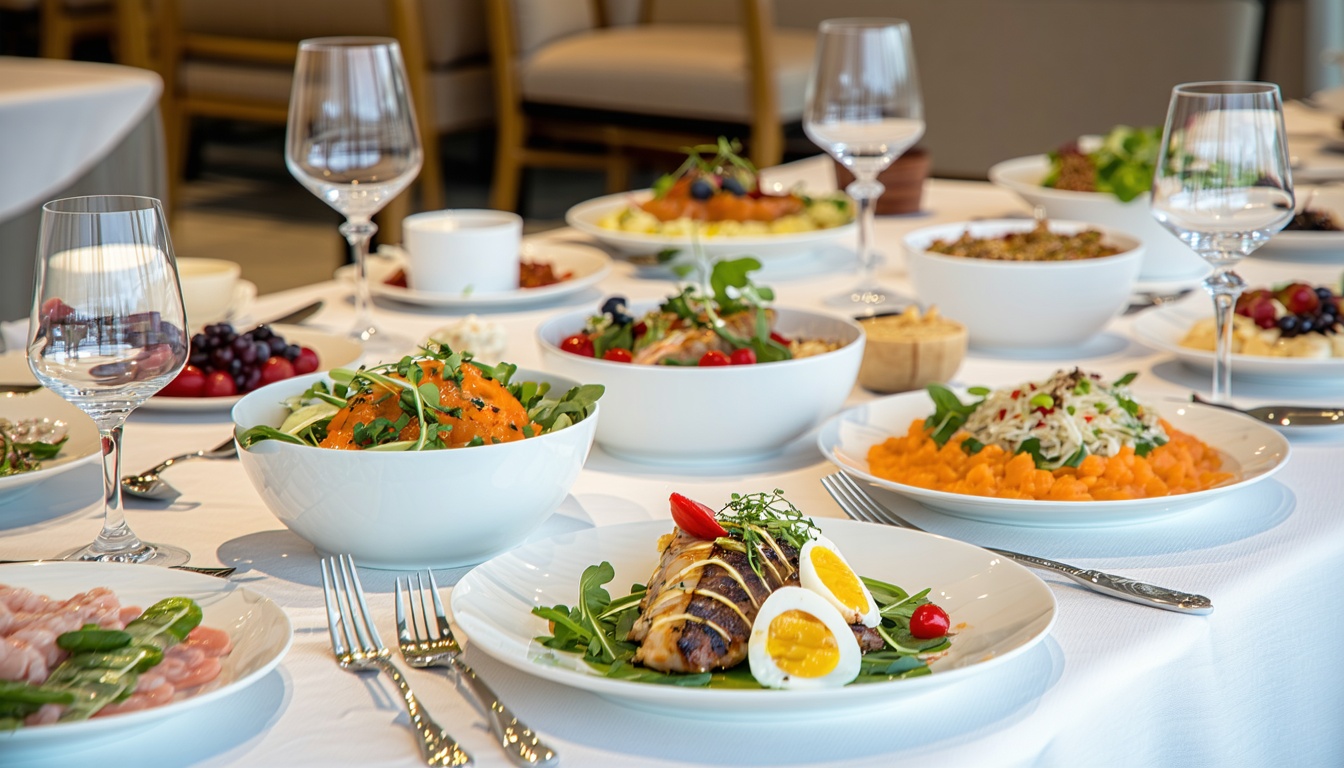The Benefits of Gourmet Meals in Rehab
Gourmet Wellness in Rehabilitation
At Recovery Bay Center, we understand that food plays a crucial role in the rehabilitation process. Gourmet meals not only provide essential nutrients but also contribute to wellness and recovery. By integrating culinary therapy into our programs, we use cooking and food preparation as a means to promote both physical and mental well-being. This approach helps clients develop new skills, regain independence, and ultimately, improve their overall wellness (Method Treatment).
Luxury rehabilitation centers enable us to personalize meal plans tailored to individual preferences and dietary needs. This customization empowers clients, enhancing their self-efficacy and encourages healthier lifestyle choices post-recovery (Carrara Treatment). Our clients develop a connection to their food, which can play a significant role in their recovery journey.
| Benefit of Gourmet Meals | Description |
|---|---|
| Nutritional Value | Provides essential nutrients that support physical and mental health. |
| Skill Development | Engages clients in cooking classes and nutrition workshops, fostering independence and creativity. |
| Personalization | Tailored meal plans adapt to individual health needs and preferences, enhancing control over dietary choices. |
Culinary Therapy and Well-Being
Culinary therapy fosters an environment where clients can engage in mindful cooking and creative activities. These experiences help reduce stress, boost confidence, and improve cognitive and motor skills. Additionally, culinary therapy promotes teamwork and social interaction, essential elements in the recovery process (Carrara Treatment).
Research shows that eating away from home can lead to an increase of 130 calories per day and a decrease in diet quality (PMC). Therefore, providing high-quality meals in a rehabilitation setting ensures that clients receive balanced nutrition that positively impacts their recovery.
By adopting a culinary therapy framework within our recovery programs, we not only enhance our clients’ dining experiences but also support their holistic recovery journey. Creating a nourishing environment allows our clients to heal and thrive, paving the way for a successful transition into a healthy, balanced life after rehabilitation. For more information about our services, check out medical detox and inpatient drug rehab.
Nutritional Importance in High-End Centers
When choosing a recovery center, the nutritional quality of meals plays a significant role in the overall treatment experience. At Recovery Bay Center, we understand that incorporating gourmet meals into our rehabilitation programs elevates not only the dining experience but also fosters healing and recovery.
Quality of Gourmet Meals
At high-end rehabilitation centers, gourmet meals are prepared with care, employing professional chefs who focus on creating delicious yet nutritious dishes. These meals are not just about satisfying hunger; they are integral to the healing process.
Gourmet food is designed to provide essential nutrients that can support the body’s recovery, boost the immune system, and reduce inflammation. Research shows that enjoying well-prepared meals can positively impact mood, alleviate stress and anxiety, and enhance overall well-being. A focus on fine dining and high-quality nutrition helps clients not only restore healthy eating habits during recovery but also reinforces their commitment to a healthier lifestyle.
| Meal Component | Importance |
|---|---|
| High-quality proteins | Support muscle recovery and tissue repair |
| Fresh vegetables and fruits | Rich in vitamins and antioxidants that combat inflammation |
| Whole grains | Provide sustained energy and vital nutrients |
| Healthy fats | Essential for brain health and reducing inflammation |
Nutrient-Dense Ingredients
Our gourmet meals at Recovery Bay Center emphasize nutrient-dense ingredients, which are critical for promoting physical and mental wellness. Each dish is crafted with fresh, high-quality components that are rich in vitamins, minerals, and antioxidants. This thoughtful approach not only enhances flavor but also ensures that clients receive essential nutrients to support their healing journey.
By working closely with our clinical team, our chefs design menus that cater to various dietary restrictions, preferences, and individual health needs, aligning culinary excellence with comprehensive care. This strategy significantly contributes to the overall success of recovery.
Incorporating meals that focus on therapeutic nutrition into our rehabilitation programs fosters an environment where clients can thrive holistically, combining physical, mental, and emotional healing. Thus, the culinary experience at Recovery Bay Center is more than just gourmet meals; it is an essential part of our drug and alcohol detox and overall treatment approach.
The Role of Professional Chefs
In our journey towards recovery, the role of professional chefs in high-end rehabilitation centers cannot be overstated. These culinary experts design and prepare meals that not only please the palate but also support our physical and mental well-being. Their involvement is essential in ensuring a holistic approach to rehabilitation through gourmet meals.
Expertly Crafted Menus
Professional chefs take the lead in creating expertly crafted menus tailored for patients in rehab. Collaborating closely with medical teams, they develop menus that are not only visually appealing but also meet the dietary requirements of those in recovery. Each dish is carefully considered, ensuring it is both flavorful and nutritious. According to Method Treatment, the ability of chefs to cater to individual dietary restrictions or preferences plays a crucial role in our journey towards recovery by making meals satisfying and enjoyable.
| Menu Feature | Details |
|---|---|
| Nutritious Options | Balanced meals rich in proteins, carbs, and fats |
| Dietary Considerations | Gluten-free, vegan, or other specific diets |
| Presentation | Meals designed to be visually appealing |
| Flavor Profiles | Unique combinations that enhance taste |
Personalized Meal Plans
Each individual’s recovery process is unique, and so are their nutritional needs. Professional chefs are dedicated to creating personalized meal plans that align with our treatment goals, dietary needs, and personal preferences. By focused attention on proper nutrition, these plans can significantly enhance our overall health, improve emotional stability, and support cognitive function during this vital time. As indicated by Carrara Treatment, fine dining experiences in luxury rehab centers not only provide essential nutrients but also restore healthy eating habits, integral for our recovery.
| Personalized Element | Example |
|---|---|
| Customized Meals | Specialized dish tailored to needs |
| Nutritional Focus | Emphasis on essential vitamins and minerals |
| Adapting to Preferences | Allowing choices to improve satisfaction |
The impact of professional chefs within our rehabilitation cannot be overlooked. As they design expertly crafted menus and personalized meal plans, they are pivotal in enriching our recovery experience while simultaneously supporting our physical and psychological needs. This holistic approach to gourmet meals in rehab emphasizes why choosing a facility like Recovery Bay Center is an essential step in our recovery journey. For more insights on the comprehensive care we offer, visit our pages on residential addiction treatment and mental health treatment addiction.
Incorporating Nutritional Education
Informed Food Choices
We recognize that informed food choices are essential for those in recovery. Nutritional education is a critical component of gourmet wellness programs offered at high-end rehabilitation centers. By providing clients with the knowledge and skills needed to make healthy choices, we empower them to take control of their dietary habits. This knowledge not only enhances the recovery experience but also establishes a foundation for sustaining healthy eating patterns long after treatment ends. Programs may include cooking classes, nutrition workshops, and farm-to-table dining experiences to enrich understanding and enjoyment of healthy foods Method Treatment.
| Nutritional Education Component | Description |
|---|---|
| Cooking Classes | Hands-on workshops that teach culinary skills, fostering independence and confidence in the kitchen. |
| Nutrition Workshops | Discussions on meal planning, understanding food labels, and exploring the role of nutrition in recovery. |
| Farm-to-Table Dining | Meals prepared with fresh, local ingredients to promote awareness of healthy sourcing and eating. |
Healthy Lifestyle Post-Recovery
Maintaining a healthy lifestyle after rehab is vital for continued improvement. Our programs emphasize the importance of continuing nutritional education to help clients implement what they learned during their stay at the center. Strategies include developing cooking skills, managing emotional eating, and seeking community support to reinforce healthy behaviors in daily life. Research indicates that structured cooking interventions can greatly impact socialization, self-esteem, and overall well-being, providing significant support during and after substance abuse treatment (NIH).
| Post-Recovery Strategies | Impact on Recovery |
|---|---|
| Developing Cooking Skills | Promotes independence and confidence, reducing reliance on unhealthy options. |
| Managing Emotional Eating | Supports mental health and reduces relapse potential. |
| Seeking Community Support | Builds a network that encourages accountability and healthy lifestyle choices. |
By focusing on informed food choices and promoting healthy post-recovery lifestyles, we can significantly enhance the rehabilitation process. This holistic approach not only nurtures physical health but also supports emotional and psychological well-being, ultimately leading to a more sustainable recovery journey. For more information about our comprehensive care programs, explore our offerings on medical detox or residential addiction treatment.
Psychological Impact of Gourmet Dining
Experiencing gourmet meals during rehabilitation extends beyond nutrition—it plays a vital role in enhancing our psychological well-being and fostering meaningful connections. At Recovery Bay Center, we recognize the myriad benefits that high-quality dining can provide to our patients as an integral part of the recovery process.
Mood Enhancement Through Food
The relationship between food and mood is well-documented. Studies have shown that participation in structured cooking interventions can lead to significant improvements in self-esteem and overall mood. For instance, a study indicated that mental health patients who participated in baking sessions noted increases in concentration, coordination, and confidence. In our gourmet meals rehab program, we aim to replicate this positive impact by using food preparation as a means of boosting morale and encouraging emotional stability.
Furthermore, cooking activities have demonstrated a notable ability to distract individuals from anxiety or negative thoughts, which is crucial in a rehabilitation setting. Engaging in the process of preparing and enjoying gourmet meals can serve as a therapeutic outlet, reducing stress and enhancing self-perception. This connection between culinary arts and mental health highlights the importance of incorporating pleasurable dining experiences into our treatment protocols.
Social Connections and Mindfulness
Socialization is a critical component of recovery. Cooking and sharing gourmet meals promotes a sense of community and belonging among individuals in rehab. Research suggests that structured cooking groups improve social connections and strengthen family relationships (NIH). At Recovery Bay Center, we encourage group dining experiences that not only enhance culinary skills but also forge friendships and support networks among participants.
Mindfulness is another beneficial aspect of gourmet dining. The focus required during cooking—the preparation of ingredients, the mindfulness of flavors, and the enjoyment of shared meals—serves as a form of meditation, drawing attention away from distressing thoughts. This mindful approach to cooking and dining can lead to enhanced well-being, contributing positively to the overall recovery experience.
In conclusion, the psychological impacts of gourmet dining are multifold, fostering mood enhancement and promoting social connections. At Recovery Bay Center, we understand these benefits and incorporate them into our recovery programs, ensuring that our patients not only heal physically but also thrive emotionally and socially. For more information on our recovery programs, including residential addiction treatment and medical detox, please explore our resources.
Supporting Holistic Recovery
Nourishment Beyond Basics
At Recovery Bay Center, we understand that effective recovery from substance abuse involves more than just detoxification and therapy. Incorporating gourmet meals into our rehabilitation programs plays a significant role in enhancing the recovery process. High-end substance abuse treatment centers prioritize nutrition by offering gourmet meals made with organic and sustainable ingredients, which not only support physical rehabilitation but also nourish the soul (Wish Rehab).
Research highlights that proper nutrition is fundamental to successful recovery, aiding in healing the physical damage caused by addiction and promoting emotional stability. A well-balanced diet contributes to improved energy levels and mental clarity, allowing individuals to navigate the challenges presented by detox and recovery more effectively. By focusing on healthy eating patterns, we equip clients with the nutritional support essential for building psychological resilience and fostering a positive mindset (Wish Rehab).
| Component | Benefits |
|---|---|
| Organic Ingredients | Support overall health and wellness |
| Nutrient-Dense Meals | Aid in physical recovery and improve mental clarity |
| Gourmet Dining Experience | Enhance emotional well-being and satisfaction |
Empowerment Through Choice
We believe that empowerment through choice is a vital aspect of the recovery journey. Our personalized meal plans take into account individual preferences, ensuring that clients feel a sense of autonomy over their nutrition. Individuals recovering from alcohol use disorder, opioid addiction, and stimulant abuse are encouraged to focus on dietary approaches that support their rehabilitation journey. By making informed food choices, clients can foster a positive relationship with food and develop skills that promote a healthy lifestyle long after leaving our facility.
Maintaining healthy habits post-rehabilitation is crucial for sustained improvement. We emphasize the importance of nutritional education, teaching clients how to manage emotional eating, develop cooking skills, and seek community support. These practical strategies empower individuals to take charge of their health and well-being during and after their time at Recovery Bay Center.
Incorporating gourmet meals in our rehab program not only makes the recovery process more enjoyable but also lays the foundation for lasting change. By focusing on nourishment beyond the basics and empowering clients through choice, we create a holistic recovery experience that addresses the mind, body, and spirit.





